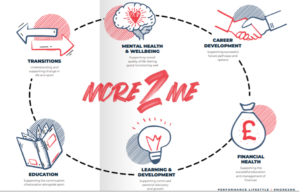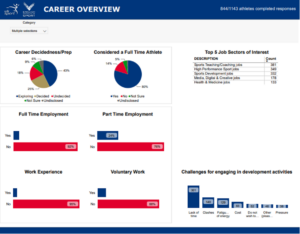Data-informed holistic athlete development
The Performance Lifestyle (PL) team at the English Institute of Sport (EIS) work with a person-first approach to provide an individual coaching service to all World Class Programme (WCP) athletes. Here, Jane Holden – Senior Performance Lifestyle Coach – explains how PL worked with the EIS Performance Data team to integrate data more effectively, particularly in their education insights work.
The EIS Performance Lifestyle team is the British Career Assistance Programme (CAP) for World Class funded athletes that leads the area of holistic athlete development. Education is one of the fundamental areas that often underpins other areas of the service, including career development, transitions, mental health and well-being.
All athletes should be able to access high quality education during their time on a WCP should they wish to do so, as part of their personal development plan that supports them to prepare for their lives after sport. Increased flexibility is often required for athletes to ensure a positive learning experience, it can often take a longer period of time, but part time studying can be more effective, especially for those managing a full-time training load.

Performance Lifestyle More2Me Model
The requirement for educational support varies between sports and subsequently the type of support a Performance Lifestyle Practitioner (PLP) provides. Early maturational sports such as gymnastics and diving have specific requirements around secondary education, often requiring flexible curriculums and sitting exams abroad. Older maturation sports such as sailing and hockey may have a higher education focus with a dual career strategy, often requiring a PLP to form relationships with a network of universities around specific training sites.
There are many unknowns in elite sport, however one inevitable aspect is athletic retirement. There are numerous transitions an athlete experiences within education and their sport, often requiring support from a range of stakeholders. PLPs support athletes exiting a WCP and there is also an option of extending this support with a designated transitions team.
There is significant evidence to support athletes engaging in education and learning activities. Level 2 literacy and numeracy are essential components of personal and professional development and are the building blocks for all future skills and qualifications. Athletes in early maturation sports often benefit from learning alongside their peers, which is important for social development and can help athletes to switch off from their sporting requirements. Lavelle (2018) found a link between performance and athletes that engage in dual career activities. The research found those that actively prepare for their career transition and engaged in personal development activities, are more likely to be selected for matches and had more successful and longer careers.
The Journey
Since the London 2012 Games, the PL team have collected educational data in their sports once a cycle to capture the educational landscape in their sport. This has provided a snapshot across each sport at a given point during an Olympic and Paralympic cycle and has provided a useful overview of the athlete’s educational needs in each sport. However, there were challenges with data collection and this information soon became out of date.
To help bridge the skills and knowledge gap of building a centralised system, the PL team collaborated with the EIS Performance Data team, to create more efficient processes in the data collection and analysis. Practitioners collected data in 1:1 sessions with athletes. By working with the Performance Data team, the PL team were able to continue using a similar tool, which was familiar to practitioners, but in a much more efficient way. Alongside the tool, the Performance Data team helped to create a series of dashboards to generate insight from the data collected.
A number of sports completed the pilot, James Hooper, PL Coach from Boxing reflected on his experience:
“The conversations with athletes during data collection allowed for wider conversations around the importance of education and provided an opportunity to challenge some misconceptions about what education could mean for the individual – it doesn’t all have to be sat in a classroom or lecture theatre! The results demonstrated a more extensive and varied educational background than might have been assumed with this population, with some athletes studying at Level 7. The dashboard enabled me to communicate the educational landscape in boxing more effectively with the support team.”
Whilst the tool proved successful, there were still some challenges with the amount of data collected. During the pilot, there was only a 20% response rate across all world class athletes. So, whilst there was an efficient tool, it was understood that we a more sustainable way of collecting data was required, so it was decided to collaborate and align data collection with UK Sport’s Athlete Investment Team.
Harry Ellis from the Athlete Investment (AI) team at UK Sport explained:
“With the close working practices of AI and PL, and after seeing the excellent work from previous Olympic and Paralympic cycles in this area, UK Sport spotted an opportunity to collaborate and evolve this with the PL team and help to advance our understanding of the education and career development landscape within the WCP.
“Our support on this mainly comes through the data collection aspect. We have now adapted our system so that it collects this important education and career development data from every athlete on WCP that applies for an Athlete Personal Award (APA). To support this further, we developed a series of dashboards that pulls through this information and presents it for the entire WCP and sport by sport, which has allowed us to start building an excellent picture of the athlete cohort.”
This entire process required a number of iterations and collaborations with different teams. The work with the Performance Data team enabled PL to create an effective data collection tool but also helped to explore how to integrate data more effectively into a holistic support service to gain greater insight and understanding of the athletes we support. The work with the Athlete Investment team then enabled a more sustainable way of collecting data as well as generating further insight.
Education Insights
Following the collaborations with Performance Data and Athlete Investment, this new system is now active, and PL are now able to create dashboards for the entire world class athlete population in the areas of education and careers. Initially, the data for Level 2 literacy and numeracy will be explored, as this is a critical success factor for further education and future careers. Early analysis shows there are 39% of World Class athletes that have experienced higher education at Level 4, according to the last census 33.8% of the population attained a Level 4 qualification.

Education dashboard for all athletes on a World Class Programme
Career Development Insights
The career dashboard enables a PL practitioner to understand the level of career decidedness and the job sectors of interest for the athletes they work with. Initial findings from the dashboard suggest a key area for development is to support athletes to engage further with work experience and providing further opportunities in targeted job sectors that athletes have identified.

Further analysis will be carried out during the Paris Olympic and Paralympic cycle to better inform practice. This initiative provides the PL team with a deeper understanding of athletes and sports and helps to evolve our practice. There is now a live data set to better understand the relationship between education, careers and sporting performance for elite athletes. This provides an objective measure for practitioners to build on their PL sports strategies and to ensure athletes can access education and career development, at any stage of their athlete journey.